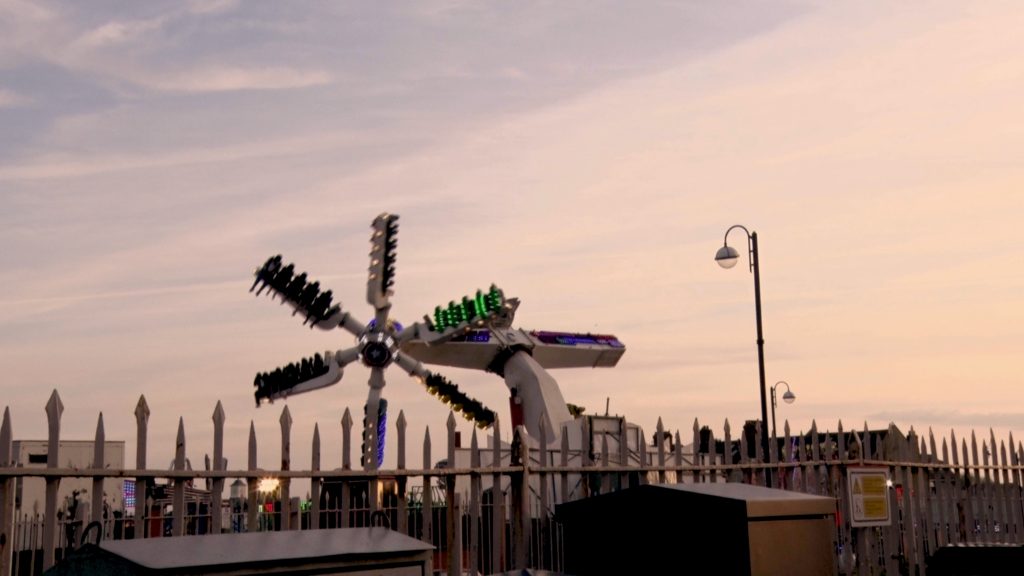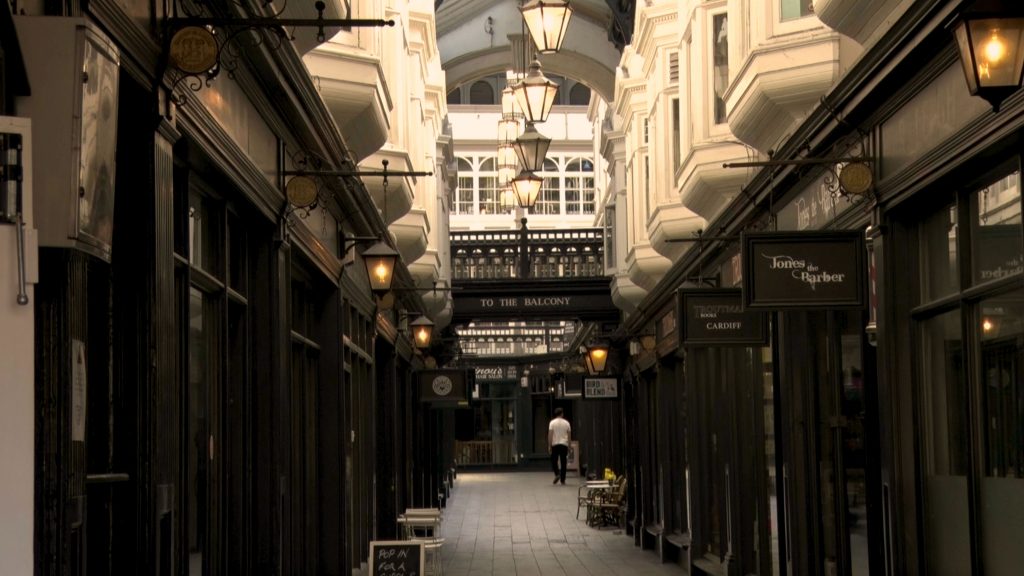Would the new fee on visitors to Wales “effectively destroy” the tourism economy? It is causing concern among hospitality executives, small business owners, and tourism managers.
Barry Island pleasure park next to the train station serves as a relaxing break from the beach. After the sea breeze blowing, mixing the smells from fish chips stores, there are a variety of smells in the air. Live concerts can be heard in the background. Lights flash all over the place from carnival games.
The park had fallen silent two years ago because of the pandemic, with no lights, no people, no sounds. Nowadays, as the covid situation gets better, more people choose to go out. This helps to maintain the park active and cheerful.
But there could be a drop-in visitors and bustle if a new law is introduced that aims to tax tourists heading to Wales on holiday.
“I think it’s madness. Why tax visitors for coming out. It doesn’t make sense. The government should be encouraging people to come out,” said Harry Danter Parks, a manager from Barry Island pleasure park.

This proposed tax would influence Welsh domestic tourism recovery following Covid.
“At first, we were very worried about covid time, because we didn’t know if we were gonna get reopened or if it was gonna go bankrupt because obviously all our money’s invested. We’re lucky enough to save money from the year before to get it through. And then when we eventually go in June, wasn’t quite sure what to expect,” said Harry.
Due to the planned tourist tax policy, anyone staying overnight in a hotel, self-catering apartment, or campsite would be required to pay the cost. For travellers, the cost to travel to Wales is higher than before. This may lead to a boycott of Welsh holidays.
Philip Rees runs a traditional sweet shop at Penarth coastline, he reckons the travel expense in Wales is already very high.
“Visitors will stay in the place all down to their budget. Sometimes it can be expensive in this country [Wales] to buy consumables to you know, normal meals, sort of hotels and Airbnbs, they can work out quite expensive,” said Philip.
Some oversea visitors claimed that the travel expense is already high enough. Going to Europe would be less expensive than going to Wales.
Iris is a Greek tourist who travels in Cardiff. He thinks the tourists have paid a lot when they go out. The tax policy’s purpose is to get more money from tourists.
“I don’t know why they charge for the overnight. That’s a bit weird because you’re visiting a country, you pay for the airplane tickets, for the visa, you pay for everything else. So, you give a lot of money to travel already,” said Iris.
He expresses the view that if Cardiff imposes a tourist tax, he will not visit. “Bristol is like maybe an hour from here. So I will just go to Bristol if they’ve not charged me there,” he said, “or I will just stay at home and play with games.”
“I think it’s insane you know, by taxing people coming out. If anything, they[government] should not cost them more money. It’s not fair. With funeral and inflation, they cost a lot of money to keep going,” said Harry.

As a result of the pandemic, the average amount of debt held by small businesses in Wales increased from 57% to as high as 77%.
Jim Jones, the chief executive of North Wales Tourism, is worried about the tourist tax. If the tax increase is combined with the cost-of-living crisis, they have the potential to seriously harm the Welsh hospitality sector.
“As a visitor come to North Wales to stay overnight, as well as being 20% tax. We’re now being asked to pay in of a percentage tax on top of that for bed nights for the chosen tax,” said Jim.
Increases in national insurance, the return of business rates, and the recent VAT increase, combined with inflation, would cause problems for Welsh businesses, and also show the fragility of the industry at the moment.
“While you would add a tax, we still pay 20% VAT. It did go down on a pandemic to 5%. We were hoping it would go up for twelve and a half percent but it’s now going back up to 20%,” said Jim.
In Wales, 25% of all VAT registered businesses are in the visitor economy, which has proved to be highly resilient in the face of austerity.
If the expense keeps increasing, the visitors will probably choose other places to go out. This indicates some uncertainties to the small business that relies on visitors’ consumption.
For one Welsh souvenir shop next to the Cardiff Castle, overseas visitors account for 75% of their business. They suffered greatly during the lockdown period because no one can travel at that time.
“We’re still recovering. I would say we’re probably even now only at about 50% And it’s just gradually getting better. Maybe 55% Now,” said the shop owner Robert William Rice.
With the COVID regulations, Cardiff castle house closed for about eight months. The public square was open, but people were just allowed to travel five miles and had to keep their distance.
“It will take a lot of time to recover. We do rely heavily on tourists. We’re still waiting for a lot of tourists, especially from America, Canada, New Zealand, Australia, and all over Europe,” said the castle’s tour guides Jo Dean McGrath and Wynne Davis.
“A lot of those haven’t come back yet. Because there are still plenty of countries that are still in lockdown or there is some sort of restrictions. People are still worried about traveling as well,” said Wynne.

As tourism is one of the most important industries in Wales, charging tax would probably impact different districts of Wales, particularly in North Wales.
Jim examines the operations of his tourism company, he said, “in fact, charging tax has more impact on North part of Wales because we rely more on tourism. Tourism for us is our biggest industry is 3.6 billion pounds to our economy. So I think it’ll have a bigger impact than South Wales.”
The day visitors who probably will not be taxed are the ones that come in, however, for a day and don’t spend as much money. If the visitor could stay longer, they spend more.
“We want are the people who come and stay overnight for a long weekend or for a week or two weeks. Because they spend lots of money in our cafes or restaurants or attractions, and obviously our hotels as well,” said Jim.

Although conducting the tourist tax might cause some panic in the tourism economy. Some locals reckon that these funds could use to improve facilities for both locals and visitors.
“Obviously, no one likes to hear about any tax on anything. But I understand why the Welsh Government would want to do that. And indeed, when we all go on holidays and travel, we’re paying we’re paid tourist tax all the time. You know, I mean, I’m going to Greece in the next month or so, for a short break. And yes, I’ve seen that I’ve seen the tourism tax listed on there, you know, so it’s quite a general thing that I believe,” said Robert.
“It kind of makes sense. If the tax helps build the tourism facilities, I guess it’s a good thing. But it depends on how much they’re charging. The government doesn’t want to take the bank and take too much money from people. Otherwise, this gonna push tourists away. I guess this is a balance that they need to figure out,” said a resident who is originally from Bristol, and now lives at Cogan at Cardiff.
A Welsh Government spokesperson said, “Visitor levies are commonplace across the world, with revenues used to the benefit of local communities, tourists, and businesses.”
Compared to the world, The UK tourism industry has one of the world’s highest tax burdens, which is 20%. Tourism VAT has been reduced in 33 countries, Most European countries have significantly reduced VAT on their tourism industries to encourage growth, employment, and revenue. In the Eurozone,16 of 19 countries have tourism VAT rates of 10% or less.
On the other hand, the tour operators are still concerned that whether the tax could be a disaster for the vacationing activities.
“I hope it isn’t coming out because it’s gonna be a lot worse to the industry. We’re a beach area. Obviously, we need people to come here,” said Harry.
“Leave tourist tax alone for now, because our industry tourism hospitality has had a very rough ride for the last two years. We should not be talking and talking about any form of taxes or penalties or anything like that on our sector,” said Jim.
